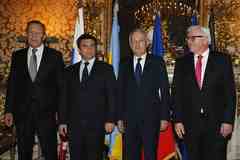Berlin, Paris Side With Moscow Against Kyiv In Normandy Group’s Meeting
Publication: Eurasia Daily Monitor
By: Vladimir Socor
The Jamestown Foundation
As anticipated (see EDM, February 26), the “Normandy” meeting on March 3–4, in Paris, cornered Ukraine to extract its acceptance of “elections” in the Russian-occupied territory. German Minister of Foreign Affairs Frank-Walter Steinmeier did almost all the hectoring; his French counterpart, Jean-Marie Ayrault, provided the echo, while Russia’s foreign minister, Sergei Lavrov, seemed content to watch almost aloof, with minimal comments.
According to Lavrov’s account, “Steinmeier and Ayrault proposed that ‘the sides’ [Kyiv and Donetsk-Luhansk] agree with each other on holding local elections by June or July. We were ready to support this proposal, but the Ukrainian side asked them not to insist, so there was no progress on the main issue, namely preparing those elections” (Interfax, March 4). Lavrov showed flexibility in his own way, giving Ukraine until July to yield. Steinmeier and Ayrault set their deadline for “June at the latest.”
Lavrov’s summary reflects the success of Moscow’s tactics thus far: exonerating Russia of the aggressor’s responsibility, forcing Kyiv to deal with Donetsk-Luhansk, and using Western hands to pressure Kyiv into conferring democratic legitimacy on Russia’s proxies in Ukraine’s east.
Steinmeier acknowledged in his concluding briefing that “elections are impossible without security” in Donetsk-Luhansk. But he admonished Ukraine that it is “unacceptable to postpone the elections ad calendas graecas,” because such “elections” are themselves a prerequisite to the political solution, i.e. changing Ukraine’s constitution by negotiation with Donetsk-Lukansk (themselves fronting for Moscow).
To hold those “elections” by June this year, Steinmeier asked “the parties” (Kyiv and Donetsk-Luhansk) to agree on providing the necessary security “in the next few weeks.” The Organization for Security and Cooperation in Europe (OSCE, under German chairmanship this year) shall draft, by March 31, a concept of providing security for those “elections,” albeit with the acceptance of the “parties to the conflict.” Apparently, deploying an OSCE civilian contingent for these elections’ duration is envisaged. The unspoken implication is that Russia would enjoy double veto powers on any “election security concept” or such a contingent: Moscow’s own veto in the OSCE, and Donetsk-Luhansk’s veto in the Minsk negotiations among the “parties to the conflict.”
As part of the same process, Steinmeier and Ayrault called for a full ceasefire and withdrawal of heavy weaponry (understood to be Russia’s) from the area, to be verified by the OSCE’s Special Monitoring Mission (SMM) with full and unimpeded access. Irrespective of this—and because this call will probably remain as unheeded as the many previous calls—Kyiv is being asked to negotiate with Donetsk-Luhansk about the modalities of “elections” and a special law applying to those “elections.” That would evidently operate outside Ukraine’s existing legal and electoral system, notwithstanding Berlin’s and Paris’s claim that Donetsk-Luhansk election procedures would conform to Ukraine’s laws (see EDM, February 19, 23, 25).
Summing up on Moscow’s, Berlin’s and Paris’s collective behalf, Ayrault reported with an undertone of satisfaction: “We have avoided retracing the history [of this conflict], we are proceeding from the Minsk agreements”—implying: there was no aggression, there is no aggressor (Auswaertiges-amt.de, Diplomatie.gouv.fr, March 4).
Ukrainian Minister of Foreign Affairs Pavlo Klimkin argued that any pre-election security arrangement would be illusory without blocking the cross-border flow of weaponry and personnel from Russia into Ukraine’s occupied territory. Klimkin called for a deployment of OSCE civilian observers on what is legally the Ukrainian side of that border, now controlled by Donetsk-Luhansk forces. Ukraine had aired this proposal in previous “Normandy” meetings. This time it added technical specifics about observation posts and monitoring equipment to be operated by OSCE observers along that 400-kilometer border section. Lavrov declined to consider such proposals in the Normandy format, but would consider referring the matter to Minsk Contact Group’s working group on security issues (Ukrinform, March 4). The reason behind such a referral is that Donetsk and Luhansk are represented in the Minsk Group and can block such proposals there, while Russia would disclaim the direct responsibility for such blocking actions.
The Donetsk and Luhansk “people’s republics” first held “elections” on November 2, 2014. No Western government or organization agreed to send observers, let alone validate those elections. Russia did validate them by announcing that it “respected” the outcome, mentoring and arming those “elected” leaders, and chaperoning them in the Minsk Group. Now, Russia is using the “Normandy” process and the OSCE for a repeat performance. In Paris, Klimkin said Ukraine would not accept “another November 2, 2014–like farce.”
Ukraine’s representative in the Minsk working group on political issues, Roman Bessmertnyy, remarked after the “Normandy” meeting in Paris: “Berlin and Paris must decide what role they want to play in this process. We would like to see them in the role of arbiters, not of lobbyists for Russian interests” (Ukrinform, March 4).
The Jamestown Foundation kindly allows Modern Tokyo Times to publish their highly esteemed articles. Please follow and check The Jamestown Foundation website at http://www.jamestown.org/
https://twitter.com/JamestownTweets The Jamestown Foundation
Photo: Russian Foreign Minister Sergei Lavrov, Ukrainian Minister of Foreign Affairs Pavlo Klimkin, French Foreign Minister Jean-Marie Ayrault, and German Minister of Foreign Affairs Frank-Walter Steinmeier (Source: reuters – this image supplied in the original article by The Jamestown Foundation)
